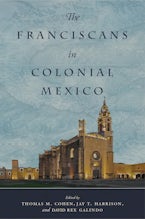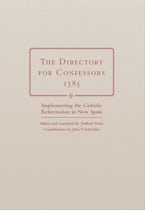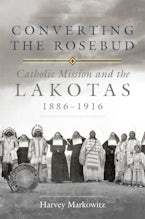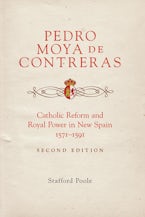RELIGION / Christianity / Catholic
Showing results 1-7 of 7
Filter Results OPEN +

The Franciscans in Colonial Mexico
Published in 2021, during commemoration of the quincentenary of the Spanish—and thus the Franciscan—presence in Mexico, the book brings together the research of junior and senior scholars from Mexico, Spain, and the United States on the long-enduring and far-reaching Franciscan presence in Mexico.
Junípero Serra
California, Indians, and the Transformation of a Missionary
In Junípero Serra: California, Indians, and the Transformation of a Missionary, Beebe and Senkewicz focus on Serra’s religious identity and his relations with Native peoples. They intersperse their narrative with new and accessible translations of many of Serra’s letters and sermons, which allows his voice to be heard in a more direct and engaging fashion.
The Directory for Confessors, 1585
Implementing the Catholic Reformation in New Spain
Rendered in clear prose and illuminated with helpful introductory chapters by Poole and John F. Schwaller, extensive annotations, and a glossary of terms, this volume offers unparalleled insights into life and thought in sixteenth-century New Spain.
Converting the Rosebud
Catholic Mission and the Lakotas, 1886–1916
Tracing the mission from its 1886 founding in present-day South Dakota to the 1916 fire that reduced it to ashes, Converting the Rosebud unveils the complex church-state network that guided conversion efforts on the Rosebud Reservation.
Patriot Priests
French Catholic Clergy and National Identity in World War I
These clergymen’s story, recounted here for the first time, elucidates a unique milestone of church-state relations in France. But it is their experiences—their hopes and fears, their struggles to reconcile their mission of peace with the demands of war, and their sense of belonging to France as well as to the Church—that reveal a new perspective on the Great War.
Juan de Ovando
Governing the Spanish Empire in the Reign of Philip II
Philip II is a fascinating and enigmatic figure in Spanish history, but it was his letrados--professional bureaucrats and ministers trained in law--who made his vast castilian empire possible. In Juan de Ovando, Stafford Poole traces the life and career of a key minister in the king’s government to explore the role that letrados played in Spanish society as they sought to displace the higher nobility in the administration through a system based upon merit. Poole’s biography of Juan de Ovando provides an intimate view of the day-to-day influence letrados wielded over the Spanish colonial machine.
Pedro Moya de Contreras
Catholic Reform and Royal Power in New Spain, 1571–1591 Second Edition
For a brief few years in the sixteenth century, Pedro Moya de Contreras was the most powerful man in the New World. A church official and loyal royalist, he came to Mexico in 1571 to establish the Inquisition and later became archbishop and viceroy for the region. This new edition of Stafford Poole's definitive portrait of Moya de Contreras, first published in 1971, now offers an expanded understanding of this enigmatic figure's influence on the development of New Spain.

The Franciscans in Colonial Mexico
Published in 2021, during commemoration of the quincentenary of the Spanish—and thus the Franciscan—presence in Mexico, the book brings together the research of junior and senior scholars from Mexico, Spain, and the United States on the long-enduring and far-reaching Franciscan presence in Mexico.
Junípero Serra
California, Indians, and the Transformation of a Missionary
In Junípero Serra: California, Indians, and the Transformation of a Missionary, Beebe and Senkewicz focus on Serra’s religious identity and his relations with Native peoples. They intersperse their narrative with new and accessible translations of many of Serra’s letters and sermons, which allows his voice to be heard in a more direct and engaging fashion.
The Directory for Confessors, 1585
Implementing the Catholic Reformation in New Spain
Rendered in clear prose and illuminated with helpful introductory chapters by Poole and John F. Schwaller, extensive annotations, and a glossary of terms, this volume offers unparalleled insights into life and thought in sixteenth-century New Spain.
Converting the Rosebud
Catholic Mission and the Lakotas, 1886–1916
Tracing the mission from its 1886 founding in present-day South Dakota to the 1916 fire that reduced it to ashes, Converting the Rosebud unveils the complex church-state network that guided conversion efforts on the Rosebud Reservation.
Patriot Priests
French Catholic Clergy and National Identity in World War I
These clergymen’s story, recounted here for the first time, elucidates a unique milestone of church-state relations in France. But it is their experiences—their hopes and fears, their struggles to reconcile their mission of peace with the demands of war, and their sense of belonging to France as well as to the Church—that reveal a new perspective on the Great War.
Juan de Ovando
Governing the Spanish Empire in the Reign of Philip II
Philip II is a fascinating and enigmatic figure in Spanish history, but it was his letrados--professional bureaucrats and ministers trained in law--who made his vast castilian empire possible. In Juan de Ovando, Stafford Poole traces the life and career of a key minister in the king’s government to explore the role that letrados played in Spanish society as they sought to displace the higher nobility in the administration through a system based upon merit. Poole’s biography of Juan de Ovando provides an intimate view of the day-to-day influence letrados wielded over the Spanish colonial machine.
Pedro Moya de Contreras
Catholic Reform and Royal Power in New Spain, 1571–1591 Second Edition
For a brief few years in the sixteenth century, Pedro Moya de Contreras was the most powerful man in the New World. A church official and loyal royalist, he came to Mexico in 1571 to establish the Inquisition and later became archbishop and viceroy for the region. This new edition of Stafford Poole's definitive portrait of Moya de Contreras, first published in 1971, now offers an expanded understanding of this enigmatic figure's influence on the development of New Spain.








